Contents
On a hot summer day, the water in a small country pool warms up naturally. In cloudy weather, the heating time increases or, in general, the temperature does not reach a comfortable value of +22оC. In large pools, natural heating takes even longer. To solve this problem, a pool heater has been created that works from different energy sources.
Heat Exchanger
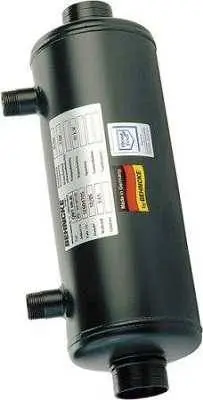
The simplest pool water heater is a heat exchanger. The basis of the design is a tank through which hot liquid flows. The connection is made to the heating system or any instantaneous water heater. A coil is built into the tank. This part is the heat exchanger. Water from the pool circulates through the coil, warming up from the hot liquid inside the tank.
Why do you need such a complex heating of the pool, if the water can simply be driven right through the heater? You can use this scheme, but there are two problems:
- Pool water contains small particles of chlorine and other impurities. When heated on the walls of the heat exchanger, they settle with a solid precipitate, clogging it.
- The water in the pool is supersaturated with oxygen, which oxidizes the metal walls of the heat exchanger.
So that an expensive boiler or a flow heater does not fail, a second circuit is equipped in the heating system. The heat exchanger is easier and cheaper to change if it becomes clogged or leaks from the oxidation of the walls.
A homemade heat exchanger is a coil of pipes connected to a heating system. In a small children’s pool, the pipeline is laid according to the principle of the “warm floor” system. The coil will warm up quickly with a small amount of water, but it will not cope with a large volume.
Electrical Models
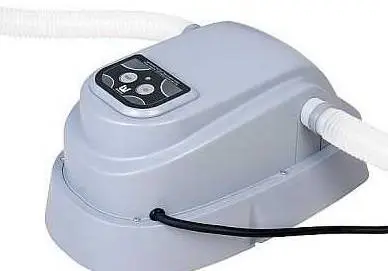
The second most popular is an electric pool heater, consisting of a body, heating elements and a thermostat. Devices are of two types:
- Cumulative. The device consists of a large tank, where water is heated by heating elements, and from there it is fed into the pool.
- Flowing. The device is connected to the water treatment system of the pool. There is a filter in front of the water heater that passes purified water, which eliminates the formation of solid deposits.
Depending on the power, the devices are connected to a single-phase and three-phase network. When calculating, the following parameters are taken into account:
- on 1 m3 outdoor pool water – 1 kW of heating element power;
- on 1 m3 indoor pool water – 0,5 kW of heating element power.
The need to heat a large amount of water requires the use of powerful appliances. Electricity costs are huge, plus a separate wiring line is required.
Heat pump
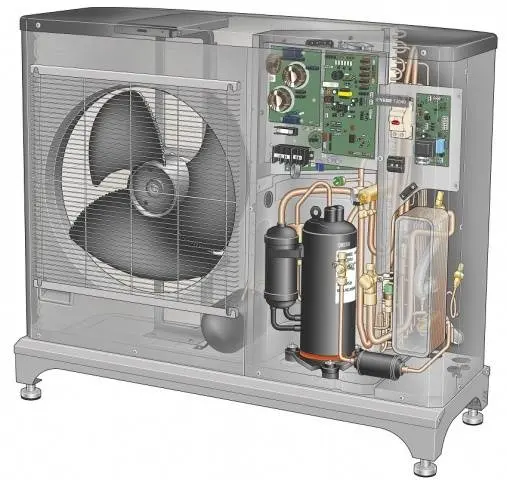
The heat pump, which is rather complicated in the device, belongs to innovative technologies. The device is efficient and economical, but is rarely used because of the high cost.
The system consists of two circuits, inside which the liquid circulates. The external pipeline is laid underground, at the bottom of a reservoir or other place where heat can be extracted. The internal circuit is located inside the pool. It gives off the heat extracted by the external pipeline to the water.
The system works according to the following principle:
- circulating liquid through an external pipeline takes heat from the bowels;
- the pump drives the coolant inside the evaporator, where the refrigerant is located in a separate chamber;
- from heat, the gas quickly boils, turning into steam;
- the vaporous refrigerant enters the inside of the compressor, where, when compressed, it releases a lot of thermal energy, which heats the coolant of the internal circuit.
The cycle is repeated while the circulation pumps and the compressor are running.
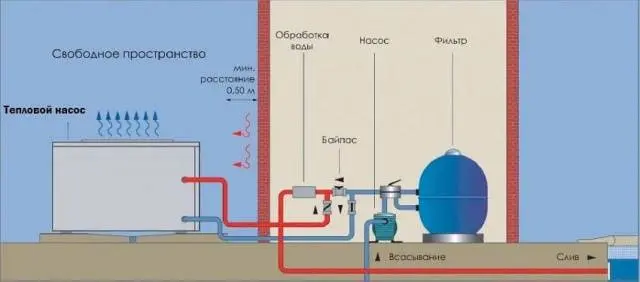
The disadvantage of a heat pump is the high cost of acquiring and installing equipment. However, the system can be equipped not only with heating for the pool, but also used as home heating. A big plus is free energy. Further costs will be only for the electricity necessary for the operation of the circulation pumps and the compressor.
Heating from solar energy
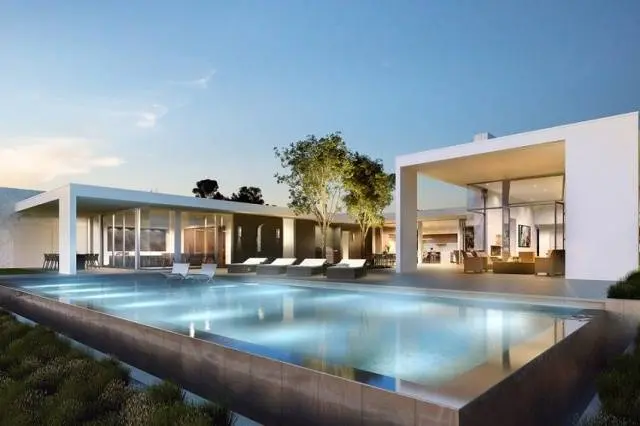
A small amount of water in the open air will warm up naturally. This happens for a long time and only in clear weather. In order to heat water in a large pool, solar energy must be concentrated. The solar system collects the rays of the sun with screens, converts them into thermal energy, from which the coolant circulating through the pipes warms up.
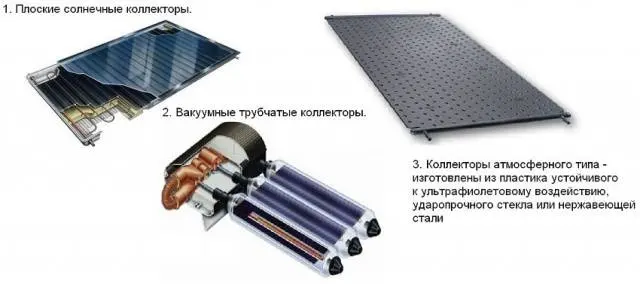
A solar system is expensive to install, but is likewise beneficial due to the use of the free energy of the sun. In addition to heating the pool, home heating can be connected to the system. Sensors and valves are used as automation with a solar system. When the water in the pool warms up to the set temperature, the coolant is sent to another circuit past the heat exchanger. After cooling, the valve opens. The coolant enters through the heat exchanger, and the heating of the water in the pool is resumed.
A powerful solar system is able to quickly warm up the water, but subject to the presence of the sun. In cloudy weather, the efficiency is greatly reduced, which is the main disadvantage. For cold regions with a minimum number of sunny days, the solar system is unprofitable.
The video shows an example of heating water with solar energy:
Wood and gas heaters
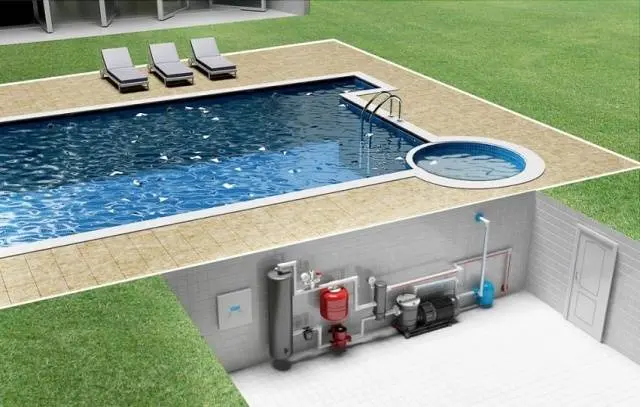
When the question arises of how to heat the water in the pool in traditional cheaper ways, wood and gas heaters come to the rescue. The principle of operation of both devices is the same. Only some structural elements differ, which depends on the type of energy carrier.
A wood-fired water heater for pools is considered simple and safe to use. The device consists of a housing with a firebox, inside which a heat exchanger is located. Anything that burns can be burned. The thermal energy of the fire heats the coolant circulating through the heat exchanger. Hot water enters the pool, and cold water returns to the heating.
Wood heaters are convenient in suburban areas where there is no gas main. Even during a power outage, the circulation pump can be started from a gasoline generator. The power of the device depends on the size of the heat exchanger, and the rate of water heating depends on the fuel used. There are models with automation that regulate the intensity of combustion by closing the dampers.
The advantage of wood-burning water heaters for swimming pools lies in the ease of installation, the low cost of equipment and fuel. The disadvantage is the smoke that interferes with rest. Solid fuel must be constantly thrown into the furnace. Automation only slightly regulates combustion. It is not possible to accurately set the heating temperature.
Gas appliances are distinguished by the presence of a burner in the furnace. The work is fully automated, and the presence of a thermostat allows you to more accurately set the temperature of water heating. The disadvantage of the device is the complexity of installation, the need for permits for connection to the highway, the high cost of energy.
Heating blanket
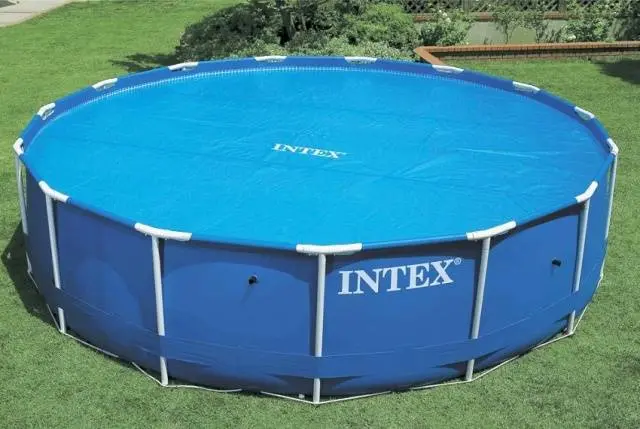
The simplest pool heater that does not require wood, gas or electricity is called a heating blanket. Under the mysterious name hides an ordinary awning or blind cover. It can be bundled or purchased separately. A lid is needed to prevent debris from entering the pool. Additionally, solar energy is accumulated on the surface of the tent, warming the water by a couple of degrees.
A heating blanket is used on small pools, usually of a collapsible or inflatable type. In cool cloudy weather, an awning is of no use.
Features of choosing a device
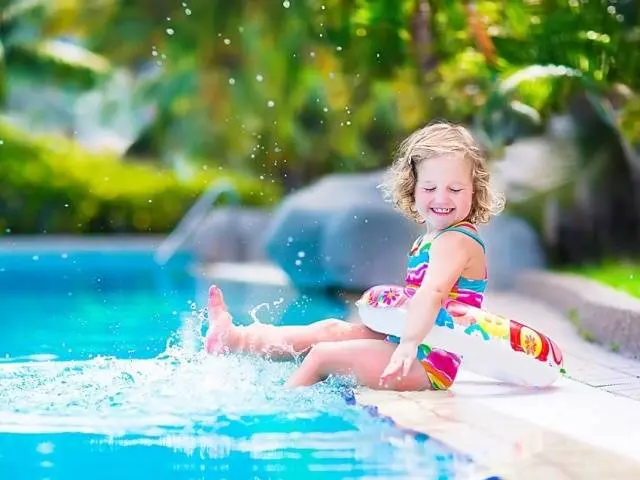
When choosing a pool water heater, it is important to consider a number of important parameters:
- The first step is to take into account the power of the device. It depends on the parameter whether the heater can handle the volume of water. In terms of power, the device can be taken with a margin. The rate of water heating will increase, but at the same time the energy consumption will increase. When buying a water heater, you need to know the volume of your pool and compare it with the recommended parameters in the device manual.
- According to the heating method, it is better to give preference to flow models. Storage tanks take up a lot of space, plus you have to heat a full tank, even if you don’t need so much hot water. Flow models are light, compact, quickly heat up. Water is supplied through a filter directly from a water supply or well.
- It is important to choose the right unit for the energy source used. You have to heat up a lot of water. The source of energy must be cheap and available. The operation of the device on gas or from modules for collecting solar energy will not cause trouble for the owner, but initially you will have to pay a large amount for the purchase of equipment. You will have to tinker with firewood, but the savings are obvious.
For country use, the only profitable option is to heat the pool with a device that burns solid fuel. In extreme cases, electric models are preferred.
Pool heating is easy to organize with your own hands. Craftsmen come up with homemade products like store units, however, they look unpresentable.









